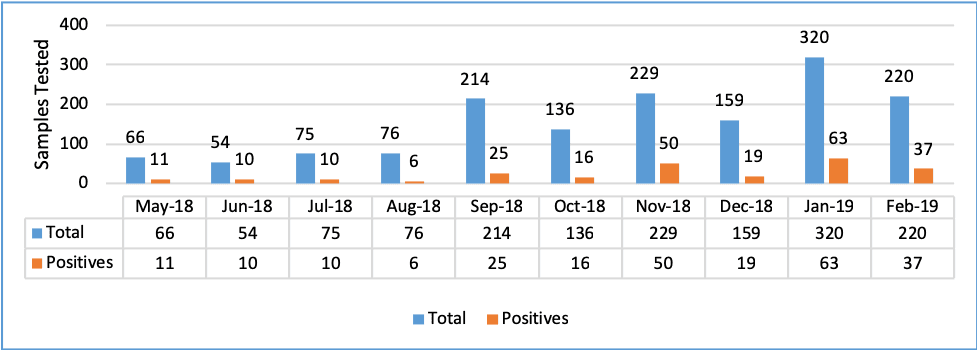Effective Use of GeneXpert Machine at Apac Hospital in Uganda Improves Identification of TB Cases
April 16th, 2019 | viewpoint
Tuberculosis (TB) can be difficult to detect and treat, especially at the community level. Many health facilities test patients using sputum smear microscopy, which only correctly identifies 50% of active cases. Chest x-rays and clinical diagnostic tests, while more effective, are often unavailable. And even if more advanced detection options, like GeneXpert, are available to a health facility, a gap in the referral system or staff training can limit how useful it is.
In 2013, the Ministry of Health provided a GeneXpert machine to Apac Hospital, a high-volume facility in the Lango sub-region of Northern Uganda. Lango has continued to see an increase in reported cases, particularly in Apac where 3,000 cases were recorded in 2017. The World Health Organization (WHO) recommends diagnostic testing with GeneXpert because it can quickly and more effectively diagnose TB, as well as identify drug-resistant TB and TB/HIV co-infection. However, despite having access to this testing equipment, Apac hospital tested very few cases—as few as two samples per day.
In July 2018, the TB team from the USAID-funded Regional Health Integration to Enhance Services-North, Lango (RHITES-N, Lango) worked with the leadership from the hospital and the district health office to identify the reasons the hospital was underusing GeneXpert. They identified a weak referral system of potential TB cases between the health facilities and the hospital and no system for reordering supplies to keep the machine functional. When the hospital did identify positive samples, it often failed to communicate the information back to the health facilities in a timely manner. All of these factors contributed to fewer cases detected and treated.
Together, the RHITES-N, Lango TB team and district and hospital leadership developed a plan to address these challenges. RHITES-N, Lango helped facilitate quality improvement meetings with lab personnel, clinical officers, linkage facilitators, and other staff to come up with solutions to the gaps identified and track progress in the use of GeneXpert. RHITES-N, Lango worked with lab staff to build their capacity to test samples and record samples from lower level health centers and to provide weekly GeneXpert reports to the National TB and Leprosy Program (NTLP). The NTLP uses this information to track TB cases, particularly drug-resistant TB cases, throughout the country and forecast the supplies and medicine needed in each region.
Apac hospital serves as a laboratory hub for Apac and Kwania districts, and a team of hub riders drives between each health facility to pick up samples to deliver to the hospital for testing. The project team reviewed and revised the hub route so that the riders now visit health facilities twice a week and put in place a protocol for the emergency pick-up of samples. RHITES-N, Lango also worked with the hospital to develop a system for ordering supplies in advance and provided financial support for routine equipment servicing. The MOH now has an MOU with the GeneXpert suppliers to ensure quarterly servicing which will reduce shortages.
The RHITES-N, Lango team also conducted activities to increase the number of people screened for TB. The project team worked with health facility staff and linkage facilitators to use intensified case finding (ICF) to trace contacts for all positive cases identified at Apac hospital. Previously, facility staff would collect samples from everyone without screening, but now the project works with the facilities to host community TB screenings for key populations and in “hot spots” where many TB patients live. The project also supported the integration of TB screenings into all community activities and increased TB screenings for People Living with HIV (PLHIV).
Since July 2018, Apac hospital has increased its GeneXpert use from 76 samples per month to 250. In the period between October 2018 and February 2019, the hospital tested 1,061 samples and identified 185 positive cases. This increase in samples tested is a result of both better reporting and referrals from the health facilities and an increased number of people screened for TB.
RHITES-N, Lango will continue to work with Apac hospital and the district health facilities to ensure the systems, services, and staff are in place to make full use of the GeneXpert machine. The project will also support the health facilities and community structures to screen people for TB and follow up with those who test positive to link them to care and treatment.
TB positive samples detected at Apac hospital, May 2018 to Feb 2019

John Snow, Inc. (JSI) implements RHITES-N, Lango in partnership with Amref Health Africa, Doctors with Africa CUAMM, Another Option, and The Medical Concierge Group (TCMG).
This publication is made possible by the generous support of the American people through the United States Agency for International Development (USAID). The contents are the responsibility of John Snow, Inc. (JSI) and do not necessarily reflect the views of USAID or the United States Government.
Written by Joseph Nturo, Gilbert Sangadi, Pamela Donggo, Dorcus Arao
We strive to build lasting relationships to produce better health outcomes for all.